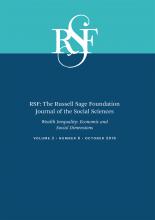Research Article
Open Access
Is the U.S. Retirement System Contributing to Rising Wealth Inequality?
Sebastian Devlin-Foltz, Alice Henriques, John Sabelhaus
RSF: The Russell Sage Foundation Journal of the Social Sciences October 2016, 2 (6) 59-85; DOI: https://doi.org/10.7758/RSF.2016.2.6.04
Sebastian Devlin-Foltz
aSenior research assistant
Alice Henriques
bSenior economist
John Sabelhaus
cAssistant director in the Division of Research and Statistics at the Board of Governors of the Federal Reserve System

REFERENCES
- ↵
- Aguiar, Mark, and
- Erik Hurst
- ↵
- Argento, Robert,
- Victoria L. Bryant, , and
- John Sabelhaus
- ↵
- Bernheim, B. Douglas,
- Jonathan Skinner, , and
- Steven Weinberg
- ↵
- Bricker, Jesse,
- Lisa J. Dettling, ,
- Alice Henriques, ,
- Joanne W. Hsu, ,
- Kevin B. Moore, ,
- John Sabelhaus, ,
- Jeffrey Thompson, , and
- Richard A. Windle
- Bricker, Jesse, Alice Henriques, Jacob Krimmel, and John Sabelhaus. Forthcoming. “Measuring Top Income and Wealth Shares Using Administrative and Survey Data.” Brookings Papers on Economic Activity.
- Bureau of Economic Analysis. 2016. “National Economic Accounts, National Income and Product Accounts.” Last modified June 1, 2016. Accessed June 8, 2016. http://www.bea.gov/national/Index.htm.
- ↵
- Clark, Robert L., and
- John Sabelhaus
- ↵Dettling, Lisa J., Sebastian Devlin-Foltz, Jacob Krimmel, Sarah Pack, and Jeff Thompson. 2015. “Comparing Micro and Macro Sources for Household Accounts in the United States: Evidence from the Survey of Consumer Finances.” FEDS working paper no. 2015–86. Washington: Federal Reserve Board.
- Federal Reserve Board. 2014. “Survey of Consumer Finances.” Last modified October 20, 2014. Accessed January 1, 2016. http://www.federalreserve.gov/econresdata/scf/scfindex.htm.
- Federal Reserve Board. 2016. “Financial Accounts of the United States.” Last modified March 10, 2016. Accessed June 1, 2016. https://www.federalreserve.gov/releases/z1/current/.
- ↵
- Gustman, Alan L.,
- Thomas L. Steinmeier, , and
- Nahid Tabatabai
- ↵Gustman, Alan L., Thomas L. Steinmeier, and Nahid Tabatabai. 2011. “How Did the Recession of 2007–2009 Affect the Wealth and Retirement of the Near Retirement Age Population in the Health and Retirement Study?” NBER working paper no. 17547. Cambridge, Mass.: National Bureau of Economic Research.
- ↵Gustman, Alan L., Thomas L. Steinmeier, and Nahid Tabatabai. 2014. “The Great Recession, Decline and Rebound in Household Wealth for the Near Retirement Population.” NBER working paper no. 20584. Cambridge, Mass.: National Bureau of Economic Research.
- ↵Henriques, Alice M. 2012. “How Does Social Security Claiming Respond to Incentives? Considering Husbands’ and Wives’ Benefits Separately.” Finance and Economics Discussion Series no. 2012–19. Washington: Federal Reserve Board. Accessed May 2, 2016. http://www.federalreserve.gov/pubs/feds/2012/201219/201219abs.html.
- ↵
- Hurd, Michael D., and
- Susann Rohwedder
- Investment Company Institute. 2016. “Quarterly Retirement Market Data.” Last modified March 24, 2016. Accessed June 1, 2016. http://www.ici.org/research/stats/retirement.
- ↵Kennickell, Arthur, and Annika Sunden. 1997. “Pensions, Social Security, and the Distribution of Wealth.” Finance and Economics Discussion Series no. 1997-55. Washington: Federal Reserve Board. Accessed May 2, 2016. http://www.federalreserve.gov/econresdata/scf/files/pensionk_s.pdf.
- ↵
- ↵
- Mitchell, Olivia S., and John W. R. Phillips. 2006. “Social Security Replacement Rates for Alternative Earnings Benchmarks.” MRRC working paper no. 2006–116. Ann Arbor: University of Michigan Retirement Research Center.
- ↵Munnell, Alicia H., Anthony Webb, and Francesca Golub-Sass. 2012. “The National Retirement Risk Index: An Update.” Issue in Brief no. 12–20. Boston, Mass.: Boston College Center for Retirement Research. Accessed May 2, 2016. http://crr.bc.edu/wp-content/uploads/2012/11/IB_12-20-508.pdf.
- ↵Poterba, James M. 2014. “Retirement Security in an Aging Society.” NBER working paper no. 19930. Cambridge, Mass.: National Bureau of Economic Research.
- ↵
- Poterba, James M.,
- Joshua Rauh, ,
- Steven Venti, , and
- David Wise
- ↵Poterba, James M., Steven Venti, and David Wise. 2012. “Were They Prepared for Retirement? Financial Status at Advanced Ages in the HRS and Ahead Cohorts.” NBER working paper no. 17824. Cambridge, Mass.: National Bureau of Economic Research.
- ↵Poterba, James M., Steven Venti, and David Wise. 2013. “Health, Education, and the Post-Retirement Evolution of Household Assets.” NBER working paper no. 18695. Cambridge, Mass.: National Bureau of Economic Research.
- ↵
- Scholz, John Karl,
- Ananth Seshadri, , and
- Surachai Khitatrakun
- ↵Starr-McCluer, Martha, and Annika Sunden. 1999. “Workers’ Knowledge of Their Pension Coverage: A Reevaluation.” Survey of Consumer Finances working paper. Washington: Federal Reserve Board. Accessed May 2, 2016. https://www.federalreserve.gov/econresdata/scf/files/penknow.pdf.
- ↵
In this issue
Is the U.S. Retirement System Contributing to Rising Wealth Inequality?
Sebastian Devlin-Foltz, Alice Henriques, John Sabelhaus
RSF: The Russell Sage Foundation Journal of the Social Sciences Oct 2016, 2 (6) 59-85; DOI: 10.7758/RSF.2016.2.6.04
Jump to section
Related Articles
- No related articles found.
Cited By...
- No citing articles found.





